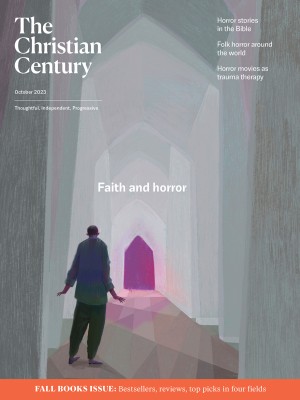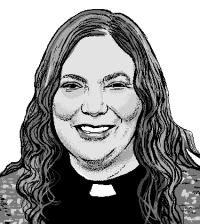My retirement to-do list
Several times a day I need to tell myself: I am not busy. I am not in a hurry.

Photo: Warchi / iStock / Getty
“I flunked retirement.” This expression pokes me where I don’t wish to be poked. People who use it sound pleased with their failure—because really it’s a sign of their ongoing vitality, purpose, and usefulness. From what I can gather, they seem to be working what most would consider another full-time job, a meaningful job, often underpaid or pro bono by choice, to help out congregations or other communities in need. Perhaps it’s less than preretirement hours, but still.
I also hear from people who have jumped into the waters of retirement with gusto. They’re free—to travel, to pursue hobbies, to putter around—and they love it! They’re winning retirement! This is their journey and I am glad for them, but it’s not mine.
Read our latest issue or browse back issues.
I retired because I needed more breathing space in my life. That has not changed, although after living in parsonages for 40 years, underpaid for most of them, I’m not yet sure if the economic reality of living in our own home will afford me all the breathing space I may desire.
Mary Forell, my internship supervisor and mentor, recently told me that when she first retired, she’d repeat to herself, “I am not busy. I am not in a hurry.” Since my own retirement this summer, I’ve had health issues that are slowly getting better but still limit my energy. It’s taking longer than I anticipated to unpack and nest. A somewhat judgy crowd of unopened boxes awaits me each morning.
Our new home is relatively small, and there is not room for everything from every box, even though we divested ourselves of much stuff before the move. I’m loving our local Buy Nothing group. No matter what I post to give away, someone comes and takes it, sometimes within the hour. I’ve taken more books to the used bookstore that already received 40 boxes from me before the move. Plenty more where those came from. In exchange, the store gave me a $300 gift certificate toward even more books, which did not please my family one bit. Today a soapstone paperweight and my childhood bedside lamp await curb pickup.
In an earlier column I mentioned sending my donkey collection to my daughter-in-law in Montana. I had not yet decided what to do with my mother’s cow collection. She dreamt of marrying a dairy farmer but instead married a chemical engineer. Over the years, she gathered her herd from the four corners of the earth. I can’t yet part with them. A shelf is being built.
The cookbooks and cookware are another story. My mom was a gourmet home cook with a chef’s supply of kitchen things. The thought is that we will now be doing much more entertaining. Who will we invite, exactly? Will we be serving a dozen people from the German champagne glasses etched with famous buildings of Lübeck, my father’s hometown? Can we even afford that much champagne befitting the elegant glasses? I have no second thoughts about the flowered Japanese plate taken by my cousin the night before the Nazis seized my grandparents in their Berlin apartment and stole the rest. Anything that escaped those fiendish hands is safe with me, but do we need three silver wine bottle holders? No, but they nestle together in the storage space of one.
Being occupied with stuff is not a fulfilling way to spend my time. I also have some writing deadlines, and until a new pastor comes to the church I served, I remain executive director of the shelter there. My mind logically tells me that focusing on getting healthier, unpacking, some writing, some shelter meetings, and glorious time with my grandchildren is more than enough while adjusting to a major life transition. But when did logic ever set my agenda? Multiple times a day I tell myself, as if chanting the hours: I am not busy. I am not in a hurry. Then my mind immediately jumps to other thoughts, the monk’s monkey brain.
I think of the many people who cannot retire, who fear what will happen when they can no longer work. The workers on strike. The asylum seekers crowding the city where I no longer live. Children drowning in the Rio Grande. Hungry, unhoused children closer to my new home. How can one stop when there are so many injustices that cry out for action? How much am I allowed to do nothing much? What is holy rest and what is lethargy?
My to-do list includes figuring out how to make our new TV system work. For now, we look out the window instead and watch the dappled twin fawns and their attentive mother who visit daily. I’m pretty certain they are the ones eating the petals of our newly planted flowers, but they are so sweet, I don’t mind. The St.-John’s-wort and blazing stars, on the other hand, repel deer but attract bees—a win-win. This Sunday, instead of counting butts in the pews I’m counting bees on the flowers (six). The squirrels love to scarf down all the mushrooms that pop up overnight. One determined groundhog is digging a hole, much cuter than the city rodents who dug in the church garden. How is the church garden faring now that my husband is not there to water and prune? Are the rats under control? It’s not my problem, but my brain has yet to let it go. At dusk, the red-crested woodpecker show begins, and we are here to watch it.
Mary told me a story about her grandmother, who worked with refugee children. One day they all received a glass of milk, and one little boy asked her, “How much of it am I allowed to drink?” “You’re allowed to drink it all,” she said. I’m allowed to drink it all. Meanwhile, I am not busy. I am not in a hurry.






